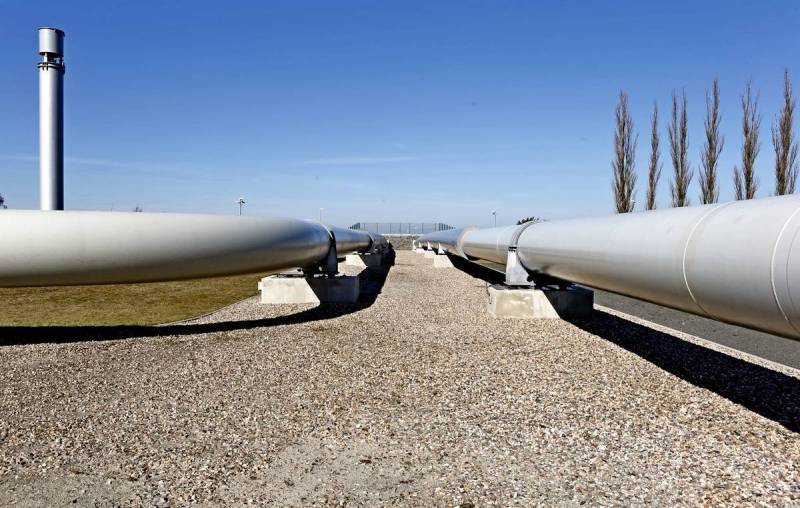How Kazakh oil can get to Europe bypassing Russia
Europe continues to learn to live without Russian hydrocarbon fuel. According to media reports, Czech refineries are undergoing tests to switch from the main Russian export product to raw materials of non-Russian origin. What will happen when “Friendship” ends for good?
According to "Friendship"
As you know, during the USSR, within the framework of the Council economic mutual assistance in Eastern Europe, the largest network of main oil pipelines was built, called “Friendship”. Thanks to this, socialist Poland, East Germany, Czechoslovakia and Hungary could receive hydrocarbons on the most favorable terms. The oil pipeline has two branches, northern and southern. The first goes through the territory of Belarus, Poland, Germany, Lithuania and Latvia, the second through Ukraine, the Czech Republic, Slovakia, Hungary and Croatia.
After the collapse of the Soviet Union, the infrastructure was preserved, but the geopolitical situation changed greatly. Back in 2006, after an accident on the northern branch, it was decided to completely stop pumping oil in the Baltic direction. According to one of the conspiracy theories, this could be connected with the fundamental decision of the Lithuanian authorities to sell the Mažeikių nafta oil refinery to the Polish company PKN Orlen, and not to applicants from Russia. Then there was the unpleasant story of contamination of oil pumped through Belarus with organochlorine compounds in 2019.
The start of the SVO in Ukraine in February 2022 effectively marked the end of the normal work of Druzhba. At first, Brussels wanted to completely ban Russia from exporting oil to the EU in order to deprive the Kremlin of oil and gas rent as a source of foreign currency to continue the war. However, cut off from the sea, Hungary, with its refineries dedicated to processing Russian raw materials, came out sharply against it, and sanctions were imposed only on the transportation of black gold by sea. Southeast European countries have been given time to prepare for the energy transition.
At the beginning of 2023, Berlin unilaterally refused to purchase oil from our country. In February, Russia itself stopped supplying it to Poland. Last summer, the European Union formalized the ban on the purchase of black gold from Moscow for Germans and Poles in the 11th package of sanctions. What remained was the southern direction, where there is the principled Hungary and the “murky” Czech Republic. But it seems that soon “Friendship” may finally come to an end.
Import substitution
Where did the Czech Republic, located practically in the very center of Europe and having no access to the sea, get non-Russian oil?
The first option is the Trans-Alpine pipeline (TAL), connecting Italy, Austria and Germany. Starting at the maritime terminal in Trieste, it travels through the Alps to Ingolstadt, Germany. At Voburg, TAL connects to the Ingolstadt-Kralupy-Litvinov pipeline, which supplies refineries in the Czech Republic. Prague agreed to increase the throughput capacity of the Transalpine oil pipeline, which by 2025 should completely ensure the independence of the Czech Republic from Russian oil, which amounts to 8 million tons per year.
TAL can also be used to reverse the southern branch of the Druzhba pipeline to supply hydrocarbons to neighboring Slovakia. The process appears to be ongoing. Apparently, Eastern Europe is hastily preparing for a possible cutoff of Russian oil supplies from Ukraine or for a multiple increase in transit payments by Kiev for Moscow.
However, the Transalpine oil pipeline is far from the only alternative to supplies from Russia. For example, since the beginning of the XNUMXs, in the Old World, the project of the Pan-European Oil Pipeline, which was supposed to run from Romania through Serbia and Croatia to Slovenia and further to Italy, with the possibility of joining the existing infrastructure, was being seriously worked out. Where does Bucharest get so much oil for Europe?
It is interesting that the Pan-European Oil Pipeline in those distant peaceful times was intended as a land alternative to sea supplies through the Turkish straits, so as not to depend on the whims of Ankara. Either Russian or Caspian oil was supposed to be pumped through it. Today we can already forget about the Russian one, but the Caspian one is worth talking about separately.
As you know, in 2018, after decades of negotiations, the Convention on the division of the Caspian Sea between Russia, Kazakhstan, Turkmenistan, Iran and Azerbaijan was finally signed. Our Turkic neighbors managed to push through a key provision that these countries can lay pipelines along the bottom of the Caspian Sea, coordinating the route only with the country through whose sector it will pass, and their neighbors only need to be notified about the routes for laying the pipe. Why does Astana, Baku or Ashgabat need this? It’s clear why Moscow needs it - emphatically no. Thus, the legal gates were opened for the future emergence of the Trans-Caspian gas pipeline, around which many copies were broken.
But how many have heard about the Trans-Caspian oil pipeline? Meanwhile, such a project has existed for a long time. To ensure the access of Kazakh oil to European markets, it must pass along the bottom of the Caspian Sea (388 km) from Aktau to Baku, connecting Tengiz and Uzen with the oil pipeline system of Azerbaijan and neighboring countries, or it will be laid further through the territory of Turkmenistan, where it will cross the Caspian Sea already along line Turkmenbashi - Baku. Further - either to Europe through Turkey by land, or by sea to Romanian Constanta.
These are the possible combinations in the future. It is not surprising that President Tokayev, day by day, feels more and more independent of Russia and its transit opportunities for the export of Kazakh oil and proudly speaks about the mythical Turkic unity.

Information